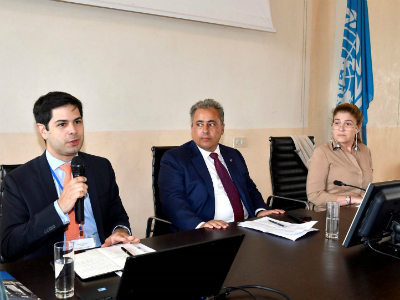Qatar Affirms Commitment to Combating All Forms of Violent Extremism, Terrorism

Venice - Information Office - 06 May
The State of Qatar stressed that extremism in all its aspects and manifestations has become a major challenge for the societies of the world, as young people and children have become the most prominent victims, reiterating its commitment to combating all forms of extremism and terrorism.
This came in a statement delivered by HE Ambassador Sheikh Ali bin Jassim Al-Thani, Permanent Representative of the State of Qatar to United Nations (UN) Organizations in Vienna, before the Sub-Regional Workshop on the Prevention of Violent Extremism organized by the United Nations Educational, Scientific and Cultural Organization (UNESCO) and the United Nations Office on Drugs and Crime (UNODC) in Venice, Italy.
HE the ambassador stressed the importance of education in facing extremism and achieving justice within the framework of the global program for the implementation of the Doha Declaration.
He pointed out that Qatar has decided to generously support the efforts of the international community to root out the disastrous phenomenon of extremism in line with its commitments to combating all forms of violent extremism, through its generous support and contributions to international funds, initiatives and programs aimed at preventing violent extremism.
HE the ambassador added that the Doha Declaration affirms the commitment of member states (to counter violent extremism that can lead to terrorism and to strengthen the efforts to implement programs to eliminate extremism), which is consistent with the sixteenth UN goals of sustainable development.
He stressed that protecting youth from extremism requires the international community to develop a long-term strategy and action plans adapted to different regions, with full respect for cultural diversity and the principles of state sovereignty as well as territorial integrity.
HE the ambassador further added that prevention is always better than treatment, and the role of education is crucial, and education programs must be supported by policymakers, civil society organizations, intellectuals, academics, religious leaders and the media, as building awareness among young people is a must, as UNESCO's slogan (building peace in the minds of men and women).
He expressed Qatar's deep appreciation for the efforts being made by UNESCO, UNODC and other UN agencies to provide training and tools to member states, particularly in developing countries, in the fight against extremism, calling for exerting more efforts in this regard.
Meanwhile, HE Ambassador Sheikh Ali bin Jassim Al-Thani held a series of bilateral meetings, with a number of representatives of the countries participating in this workshop, on the sidelines of the sub-regional workshop in Venice on preventing extremism. He also met with HE Director of UNESCO's Regional Bureau for Science and Culture in Europe Ana Luiza Thompson and her Senior Program Assistant Cristina Faccia.
He called for practical steps to be taken as a basis for the implementation of the content of the nuclear non-proliferation system in the world. He stressed that this will be achieved only by the fulfillment by all states parties, including the nuclear powers, of their obligations to maintain the universality of the treaty and achieve the highest attainable rates of nuclear disarmament.
HE Permanent Representative of the State of Qatar to UN Organizations in Vienna and to the International Atomic Energy Agency (IAEA) concluded that the state of frustration of the peoples of the Middle East reached an unprecedented level due to the repeated failure to implement the commitments to establish a zone free from weapons of mass destruction in the Middle East, noting that the region and the world are facing a defining moment in the history and there is hope that everyone is at the level of responsibility.

